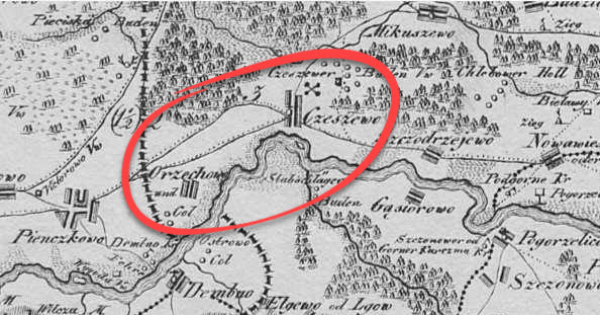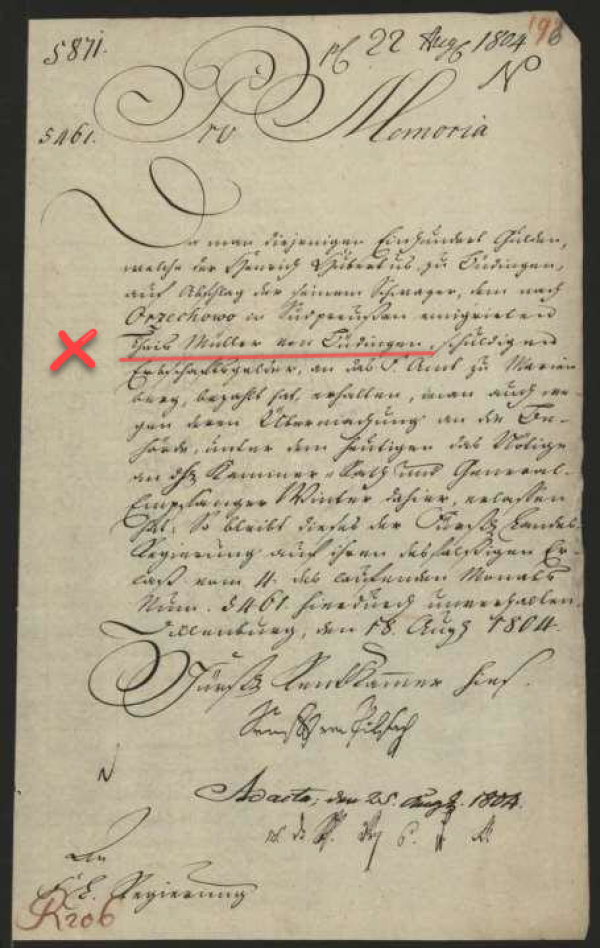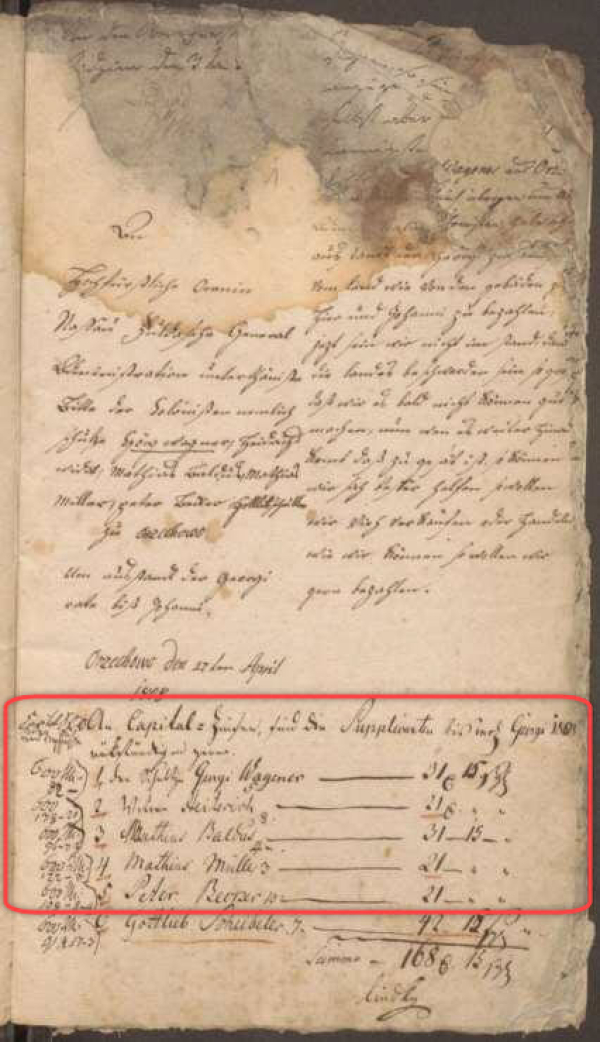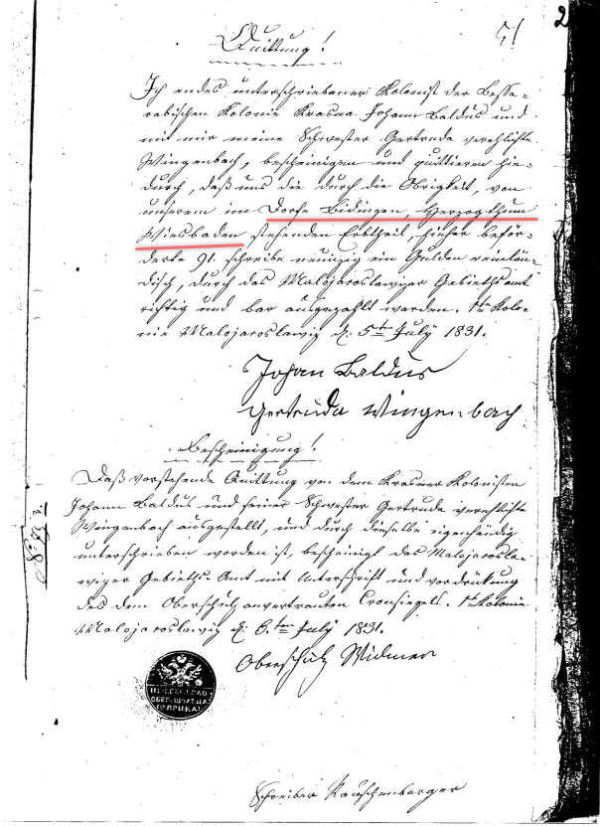_English_
User Tools
Site Tools
Sidebar
Table of Contents
2.4.2.2 Krasna people from Orzechowo (South Prussia)
When the book “Krasna” was published, the location of Orschokowin was not known.
Meanwhile we know its location.
We must keep in mind that the place called “Orschokowin” has come down to us in spoken version, from which the correct spelling differs. Tatsächlich heißt der Ort Orzechowo. It lies approximately 26 kilometres (12 mi) south of Wreschen (Polish: Września), not far from Poznan (Polish: Poznań). Orzechowo is located about 4 km southwest of Czeszewo, around 1800 the parish of Orzechowo.
(For comparison, the other place of origin mentioned in the above Gemeindebericht von Krasna Schitonitz/Sitaniec is a good 500 km further southeast and belonged to Austria at that time).
In the church register of Czeszewo, the place Orzechowo, probably depending on grammatical requirements and/or the whim of the entering priest, is written in Latin e.g. also written as follows:
- Deserta Orzechowiensia
- Neo colonia Orzechowienes
- Neo Coloni Orzechowien
This sounds very much like Orschekowin.
King Frederick William III of Prussia settled colonists in “South Prussia” on state lands and on expropriated Polish estates since 1800 (also in the region around Poznan and south of it, e.g. Lodz). But our Krasna people from Orschekowin/Orzechowo were not among the state-settled colonists.
In addition to state colonies, the Prussian government encouraged the settlement of people by private landowners. One of these was Wilhelm Friedrich Erbprinz von Nassau-Oranien. He was King of the Netherlands from 1815 as William I.
The Nassau princes had many estates in Germany to the left and right of the Lahn (especially in the Westerwald to Siegen and in the Taunus to Wiesbaden). In the period of interest to us, around 1790/1800, the largest part of the Nassau territory was owned by the Princes of Nassau-Orania with their seat of government in Dillenburg. Later, from 1815, as the map in the following picture shows, the whole area was united under one dominion with the seat in Wiesbaden.
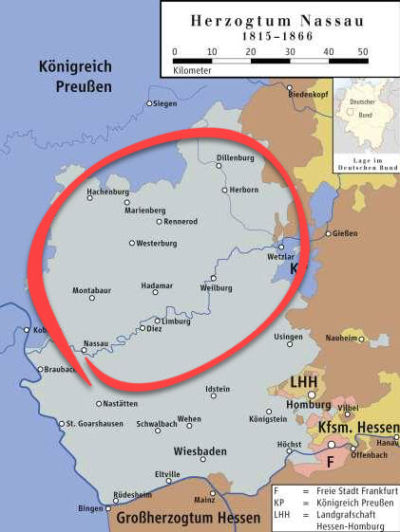
From the area Siegen-Dillenburg - Marienberg- Westerburg- Hadamar many families responded to the call of the hereditary prince to emigrate to South Prussia in 1799. At that time there was great need in the high Westerwald.
Source: https://upload.wikimedia.org/wikipedia/commons/2/2a/Duchy_of_Nassau.png · ziegelbrenner CC BY-SA 3.0 (http://creativecommons.org/licenses/by-sa/3.0/)
Wilhelm Friedrich Erbprinz von Nassau-Oranien was related to the Prussian rulers and was promoted by the Prussian king. In 1793 he bought the dominions of Kiebel and Widczin in South Prussia. In 1798 he acquired all the estates owned by Prince Joblonowsky in the Poznan Chamber Department, including the manor of Czeszewo (Wreschen District) with the villages and outworks of Mikuszewo, Chlebowo, Radzitowko and Orzechowo.
Wilhelm Friedrich Hereditary Prince of Nassau-Orania wanted to settle colonists from his native Nassau region on his estates. His efforts to do so began in 1797.
In the main state archives in Wiesbaden there are lists of people who registered for emigration to Poland in 1799 (HHStAW, 172, 2677 Verzeichnisse von Personen und Haushaltsungen, welche als Kolonisten nach Südpreußen gesonnen zu ziehen). In it one can find Krasna family names.
Of at least one emigrant from the Principality of Nassau we even know with certainty that he went to Orzechowo. There is a document in the main state archive in Wiesbaden, which says that Mathias Müller from Büdingen emigrated there.
He received an inheritance from his homeland in Orzechowo.
Doc. 172/2668, pp. 194-196 Mathias Müller from Büdingen to Orzechowo.
Many of the families who emigrated to Poland in 1799 returned to the Westerwald disappointed and impoverished after only a few years (until 1805/1806). About 80 families stayed longer. Also some with family names occurring in Krasna persevered. We have a document from 1808 which proves this 1):
So far there is no direct written evidence, but very many plausible indications that people from Orzechowo went to Krasna:
- Births and marriages of later Krasna people can be found in the church books of the parish of Czeszewo, which was responsible for Orzechowo at that time.
- The church book entries for Orzechowo stop abruptly from 1814 with German surnames. We have to consider that at that time there was extreme hardship in Poland. Napoleon had the country since 1807 firmly in his hands after the defeat of Prussia and squeezed it to finance his war campaigns (see above request for interest deferral).
The community report of Krasna mentioned at the beginning says about the hardship around 1813/14 in Poland: “The all-destroying war campaigns of the French to Russia over Poland brought the colonists almost around all their belongings.“
This was of course a valid reason to migrate on to Russia. - The names of the wandering schoolmen from Poland to Bessarabia Mathias Müller and Peter Becker mentioned in Krasnaer Gemeindebericht von 1848 appear in Orzechowo. They were around 40 years old in 1814, so the right age for the leadership position. Their names, ages, wives and some children then reappear in documents in Krasna.
- In Orzechowo, the Becker, Dressler, Müller, Heidrich, Hartmann, Wagner families intermarried and had godparents. Families of these names also had godparenthoods among themselves in Krasna in the early years.
- There are, as I will show with the list below, further a number of matches with Krasna people by name, age, marriage, parents etc. in the church book of Czeszewo.
- In a document that has come down to us, there is a hint that at least one Krasna family came from the Duchy of Nassau.\ Gertrud and Johann Baldus confirm in it the receipt of money from an inheritance from Büdingen in the Duchy of Nassau.
Both Gertrud and Johann we can discover in Büdingen, in Orzechowo and in Krasna.
Krasna families who immigrated to Krasna via Orzechowo
- Baldus No children named Baldus are born in Orzechowo; the Baldus occur only as wives and godparents.
Of the children born in Büdingen in the Westerwald, the following occur in Krasna: Gertrud, Mathias, Johannes - Peter Becker was married to Elisabeth Hartmann. Since their first child was born in October 1801, there is much to suggest that he married in 1800 or earlier, when they had not yet arrived in Orzechowo. He and his wife appear in Krasna.
The following children of the couple born in Orzechowo appear in Krasna: Anna Katharina *27.12.1803, Friedrich *01.08.1805, Elisabeth *04.04.1813. - Martin Dressler was married to Catharina Hartmann. They were married at Debno near Czeszewo on 22.01.1801. He and his wife appear in Krasna.
The following children of the couple born in Orzechowo appear in Krasna: Elizabeth *12.07.1807, Anna Maria *20.01.1811. - Petrus Hartmann (22 years old) married Anna Catharina Baltus (18 years old) in Czeszewo on 22 Nov 1803.
The following child born in Orzechowo to the couple appears in Krasna: Anna Maria *27.10.1805, In Krasna appears a Johannes Hartmann *1798, who is probably the brother of Petrus Hartmann. - Johann Heidrich was married to Elisabeth Baldus. Marriage record was not found in Czechowo church book. They probably married in Büdingen before emigration. The following children of the couple born in Orzechowo appear in Krasna: Anna Catharina *20.03.1801, Christian *04.12.1803.
- Joannes Heyn married Margaretha Hartmann in Czeszewo on 30 Jan 1814. They had a son Martin at Krasna in 1816, with Martin Dressler as godfather. Martin Dressler was also married to a Hartmann. Joannes Heyn and his wife appear in Krasna, as does Johannes Hein's brother Karl, who was godfather to his child Karl in Orzechowo.
- Matthaeus Miller, age 28, married Anna Heytrych, age 20, in Czeszewo on October 05, 1802.
The following children of the couple born in Orzechowo appear in Krasna:\ Elisabeth *08/26/1804, Mathias *09/08/1807, Anna Maria *07/08/1810, Rosina *05/12/1812. - Georg Wagner was Schultheiss in Orzechowo in 1808. He was probably married in second marriage to Rosina Jakob. He and his wife appear in Krasna.
The following children of the couple born in Orzechowo appear in Krasna: Georg *08.02.1810, Elisabeth *03.01.1813.


